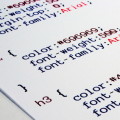Top 30 Best Tools to Analyze Website Codes
Analyzing website code is essential for developers, SEO professionals, and security analysts to ensure optimal performance, security, and functionality. The right tools help identify issues, improve speed, enhance SEO, and detect vulnerabilities. From debugging and performance testing to security auditing and SEO analysis, various tools cater to different aspects of website code analysis.
This article highlights the top 30 best tools designed for analyzing website codes, covering both front-end and back-end aspects. Whether you’re a developer looking for a JavaScript debugging tool, an SEO expert analyzing HTML structure, or a security professional scanning for vulnerabilities, these tools will streamline your workflow.
We will explore tools for code validation, performance monitoring, SEO auditing, security scanning, and accessibility testing, ensuring your website meets modern web standards. With the right set of tools, you can optimize code efficiency, improve user experience, and maintain a secure online presence. Let’s dive in!
Performance Analysis Tools
Google PageSpeed Insights is a free tool that analyzes a website’s performance and provides recommendations for improvement. It evaluates both mobile and desktop versions, offering scores based on Core Web Vitals such as Largest Contentful Paint (LCP), First Input Delay (FID), and Cumulative Layout Shift (CLS). The tool suggests optimizations like image compression, caching, and server response improvements. Developers and website owners use PageSpeed Insights to enhance loading speed, user experience, and SEO rankings. It integrates with Lighthouse to provide detailed diagnostics and suggestions to enhance website efficiency.
2. GTmetrix
GTmetrix is a website performance testing tool that provides insights into page load speed, structure, and optimization opportunities. It evaluates websites using Google’s Lighthouse metrics and offers a performance score based on various factors, including image compression, JavaScript execution, and server response times. GTmetrix allows users to test websites from different locations and browsers, simulate mobile devices, and analyze historical performance trends. The tool also provides waterfall charts, filmstrips, and video playback to diagnose bottlenecks, making it essential for developers and site owners aiming to optimize speed and user experience.
Pingdom Website Speed Test is a user-friendly performance analysis tool that measures a website’s loading time, page size, and HTTP requests. It provides a performance grade and actionable insights to optimize loading speed. The tool allows testing from multiple server locations to simulate different user experiences worldwide. Pingdom generates detailed reports, including waterfall breakdowns, content size analysis, and server response evaluations. It is widely used by web developers, marketers, and business owners to improve website speed, enhance user engagement, and reduce bounce rates by implementing recommended performance optimizations.
4. WebPageTest
WebPageTest is an advanced website performance analysis tool that provides deep insights into speed, responsiveness, and optimization. It allows users to test their websites from different geographic locations, browsers, and network conditions, offering detailed reports on first-byte time, rendering speed, and caching efficiency. The tool provides a waterfall breakdown of resource loading, highlighting performance bottlenecks. It also includes features like filmstrip view and visual comparisons to track improvements. WebPageTest is ideal for developers and performance experts who need in-depth diagnostics to enhance a site’s loading speed and user experience.
5. Lighthouse (Google Chrome DevTools)
Lighthouse is an open-source tool integrated into Chrome DevTools, designed to audit web pages for performance, accessibility, best practices, SEO, and Progressive Web Apps (PWAs). It provides detailed reports with scores in each category and actionable recommendations for improvement. Lighthouse helps developers analyze Core Web Vitals, reduce JavaScript execution time, and optimize image delivery. The tool can be run directly in Chrome or as a command-line application, making it a powerful resource for improving website speed, mobile-friendliness, and overall user experience.
Yellow Lab Tools is a free online performance and front-end quality testing tool that analyzes website speed, JavaScript execution, CSS complexity, and HTML structure. It provides a detailed score based on various performance factors, such as render-blocking resources, HTTP requests, and inefficient coding practices. Yellow Lab Tools offers insights into page weight, DOM complexity, and excessive client-side processing. The tool is especially useful for frontend developers looking to optimize their code for faster loading times and better user experience.
SEO Analysis Tools
Google Search Console is a free SEO tool from Google that helps website owners monitor their site’s performance in search results. It provides insights into search traffic, indexing issues, mobile usability, and Core Web Vitals. Users can submit sitemaps, identify crawl errors, and optimize content for better rankings. The tool also highlights security issues and manual penalties. Google Search Console is essential for tracking keyword performance, click-through rates, and backlink data, making it a must-have for webmasters, SEO professionals, and digital marketers.
Ahrefs Site Audit is a powerful SEO analysis tool that crawls websites to identify technical and on-page SEO issues. It detects problems like broken links, duplicate content, slow-loading pages, and missing meta tags. Ahrefs provides an overall health score and detailed reports on factors affecting search rankings. The tool also tracks Core Web Vitals and JavaScript rendering issues. With visualized data and actionable insights, Ahrefs Site Audit helps SEO professionals optimize websites for better performance, higher search visibility, and improved user experience.
Semrush Site Audit is a comprehensive SEO tool that scans websites for technical errors, crawlability issues, and on-page optimization opportunities. It detects issues like duplicate content, broken links, page speed problems, and security vulnerabilities. Semrush provides a detailed health score and prioritizes issues based on their impact on search rankings. The tool also offers structured data analysis and insights on Core Web Vitals. With automated reports and AI-driven recommendations, Semrush Site Audit is widely used by SEO specialists and digital marketers for website optimization.
Moz Pro Site Crawl is an advanced SEO auditing tool that scans websites for technical issues affecting search visibility. It identifies crawl errors, duplicate content, broken links, and missing metadata. Moz provides a prioritized list of issues with explanations and recommended fixes. The tool also tracks changes over time, helping SEO professionals measure improvements. With insights into page authority and domain strength, Moz Pro Site Crawl is an excellent choice for businesses looking to enhance their website’s search performance and user experience.
Screaming Frog SEO Spider is a powerful desktop-based SEO tool that crawls websites to analyze on-page SEO factors. It identifies issues like missing metadata, duplicate content, broken links, and redirect chains. The tool provides in-depth reports on page structure, indexability, and site architecture. SEO professionals use it to audit websites for technical SEO health and improve search rankings. With integration options for Google Analytics and Search Console, Screaming Frog is an essential tool for optimizing large websites.
12. Sitebulb
Sitebulb is an in-depth website auditing tool that analyzes technical SEO, page speed, and crawlability. It generates visual reports on issues such as broken links, duplicate content, and structured data errors. Sitebulb provides a detailed scoring system and prioritizes recommendations for fixing critical SEO problems. Its user-friendly interface makes it ideal for SEO professionals and digital marketers who need a comprehensive site analysis. The tool also supports JavaScript rendering and integrates with Google Search Console for enhanced insights.
Security and Vulnerability Scanners
13. Sucuri SiteCheck
Sucuri SiteCheck is a free website security scanner that helps detect malware, blacklisting status, and security vulnerabilities. It provides a comprehensive report on potential threats, including malicious scripts, injected spam, and defacements. The tool checks a website’s security reputation across major blacklisting services like Google Safe Browsing and Norton Safe Web. Sucuri SiteCheck also identifies outdated software and security misconfigurations that may expose a site to cyber threats. With its easy-to-use interface, website owners can quickly assess their security status and take preventive measures. While the scanner primarily detects external issues, Sucuri also offers premium solutions for deeper server-side scans and active protection.
14. Qualys SSL Labs
Qualys SSL Labs provides an in-depth analysis of SSL/TLS configurations for websites. This free online tool evaluates HTTPS security, checking for vulnerabilities like outdated encryption protocols, weak ciphers, and certificate chain issues. The test assigns a letter-grade score, helping website administrators understand their SSL implementation quality. It highlights problems such as Heartbleed vulnerability, protocol support, and insecure renegotiation. By analyzing SSL handshake simulations across different devices and browsers, Qualys SSL Labs ensures website security and compatibility. Regularly using this tool helps maintain strong encryption and compliance with best security practices.
Zed Attack Proxy (ZAP) is an open-source web application security scanner developed by OWASP. It helps developers and security professionals detect vulnerabilities in web applications during development and testing phases. ZAP performs automated scans for common security issues like SQL injection, cross-site scripting (XSS), and security misconfigurations. With its intuitive graphical interface and powerful API, ZAP is widely used for both manual and automated penetration testing. Its active and passive scanning modes allow users to identify risks with minimal disruption. As a community-driven tool, ZAP continuously evolves to address emerging web security threats.
16. Detectify
Detectify is a cloud-based website vulnerability scanner that leverages ethical hacker insights to uncover security risks. The platform conducts deep scans to detect OWASP Top 10 vulnerabilities, misconfigurations, and exposed sensitive data. Detectify automates security testing and continuously updates its threat database with real-world exploits discovered by ethical hackers. The tool offers detailed security reports and actionable remediation advice, making it ideal for businesses looking to fortify their web applications. Detectify seamlessly integrates with CI/CD pipelines, enabling developers to address security issues early in the development lifecycle.
17. Invicti
Invicti is an advanced web application security scanner designed for enterprises. It provides automated, accurate vulnerability detection using its proprietary Proof-Based Scanning™ technology, which verifies real threats to minimize false positives. Invicti identifies issues like SQL injection, cross-site scripting (XSS), and misconfigurations, helping organizations maintain secure web applications. The tool integrates with development workflows, allowing teams to fix vulnerabilities efficiently. With features like compliance reporting, continuous scanning, and team collaboration tools, Invicti is a comprehensive solution for web security testing.
18. Intruder.io
Intruder.io is a cloud-based vulnerability scanner designed to identify security weaknesses in websites and applications. It continuously scans for exploits, including outdated software, misconfigurations, and OWASP Top 10 vulnerabilities. Intruder.io automates penetration testing, providing businesses with real-time alerts and actionable remediation steps. The platform integrates seamlessly with development and security workflows, offering continuous security monitoring. Its user-friendly dashboard simplifies vulnerability management, making it an effective tool for businesses of all sizes looking to enhance their cybersecurity posture.
Code Quality and Validation Tools
W3C Markup Validator checks HTML, XHTML, and other markup languages for compliance with W3C standards. It helps developers identify syntax errors, missing elements, and structural issues that may affect website performance and accessibility. The tool ensures that web pages follow best coding practices, reducing cross-browser compatibility issues. By validating HTML, developers can improve SEO, enhance user experience, and ensure their websites function smoothly across different platforms.
W3C CSS Validator verifies whether a website’s CSS follows W3C standards. It detects syntax errors, outdated properties, and invalid rules that could affect website styling. The tool helps developers maintain clean, optimized CSS code for better browser compatibility and faster page loading times. By using this validator, designers can ensure their stylesheets adhere to modern best practices, improving both aesthetics and functionality across different devices.
21. ESLint
ESLint is a popular JavaScript linting tool that helps developers write clean and error-free code. It detects syntax errors, coding inconsistencies, and potential security vulnerabilities. ESLint is highly customizable, allowing developers to enforce coding standards through predefined or custom rules. By integrating ESLint into development workflows, teams can maintain code quality, improve readability, and prevent common JavaScript issues before deployment.
22. Mobile-Friendly Test by SmallSEOTools.com
Mobile-Friendly Test evaluates how well a website performs on mobile devices. It checks responsiveness, readability, and layout adaptability across different screen sizes. The tool highlights usability issues such as small fonts, unclickable elements, and slow-loading pages. A mobile-friendly site enhances user experience and improves SEO rankings, making this test essential for optimizing websites for mobile users.
23. CodePen
CodePen is an online development environment for front-end web design and coding. It allows developers to create, test, and share HTML, CSS, and JavaScript snippets in real time. CodePen is widely used for experimenting with new techniques, building UI components, and showcasing interactive designs. Its live preview feature enables instant feedback, making it a valuable tool for learning, prototyping, and collaboration.
Web.dev by Google is a performance and quality analysis tool that helps developers optimize websites for speed, accessibility, and SEO. It provides detailed insights based on Lighthouse audits, offering actionable recommendations to improve site performance. Web.dev covers key areas like mobile usability, security best practices, and progressive web app (PWA) compatibility. By following its suggestions, developers can enhance user experience, improve search rankings, and ensure their websites meet modern web standards.
Accessibility and UX Testing
25. Wave Web Accessibility Evaluation Tool
Wave is a powerful web accessibility evaluation tool developed by WebAIM. It helps developers and designers identify accessibility issues in website code by providing detailed visual feedback. Wave analyzes web pages for compliance with WCAG (Web Content Accessibility Guidelines), highlighting errors, contrast issues, and missing alternative text for images. The tool is available as both an online service and a browser extension, making it convenient for real-time analysis. By integrating Wave into your development workflow, you can improve website usability for people with disabilities and ensure legal compliance with accessibility standards. It’s an essential tool for creating inclusive and user-friendly web experiences.
26. axe DevTools – Web Accessibility Testing
axe DevTools is a browser extension that enables developers to test web pages for accessibility issues quickly. Developed by Deque Systems, axe DevTools integrates seamlessly with Chrome DevTools, allowing real-time analysis of web elements. It provides detailed issue reports with explanations, solutions, and WCAG compliance references, making it easy to fix problems. The tool is widely trusted by developers due to its accurate and automated testing capabilities. It helps improve digital inclusivity by ensuring websites are accessible to users with disabilities. Whether you are a beginner or an experienced developer, axe DevTools simplifies the process of creating accessible web applications.
27. Google Fonts
Google Fonts is a widely used library of open-source fonts that enhance website typography and user experience. It allows developers to integrate high-quality fonts directly into their website code, improving readability and design consistency. Google Fonts provides hundreds of font families optimized for web performance, ensuring fast loading times without compromising aesthetics. The platform also includes a preview tool where users can test fonts with different text sizes, weights, and styles. Developers can embed fonts using CSS or API integration, making customization effortless. By selecting accessible and readable fonts, websites can enhance user experience, particularly for individuals with visual impairments or reading difficulties.
28. Contrast Checker
Contrast Checker by WebAIM is a simple yet effective tool for evaluating the color contrast of text and background combinations. It ensures that web content meets WCAG contrast requirements, making text legible for users with visual impairments. The tool allows developers to input foreground and background colors to check contrast ratios and determine whether they meet AA or AAA accessibility standards. It also provides real-time feedback, helping designers select color schemes that enhance readability. By using Contrast Checker, web developers can improve the usability and accessibility of websites, ensuring a better experience for all users, including those with low vision or color blindness.
29. Responsinator
Responsinator is a browser extension that helps developers test how websites appear on different screen sizes and devices. It simulates a variety of viewport dimensions, including smartphones, tablets, and desktops, allowing designers to ensure responsive design compatibility. The tool quickly identifies layout issues, broken elements, and usability concerns across different resolutions. Responsinator is particularly useful for front-end developers aiming to optimize user experience across multiple devices. By using this tool, developers can detect and fix responsiveness issues early in the design process, ensuring a seamless browsing experience for users on any screen size.
30. BrowserStack
BrowserStack is a cross-browser testing platform that enables developers to test websites on real devices and browsers. It provides instant access to a vast range of mobile and desktop environments, ensuring that web applications function correctly across different operating systems. BrowserStack supports both automated and manual testing, allowing developers to identify and fix compatibility issues efficiently. The platform includes live testing, responsive testing, and debugging tools, making it an essential resource for front-end developers and QA testers. By using BrowserStack, teams can ensure a consistent user experience across all browsers and devices, improving website functionality and accessibility.
Tags: coding, web app, web development resources

































